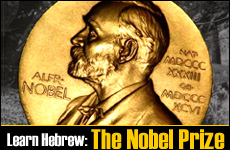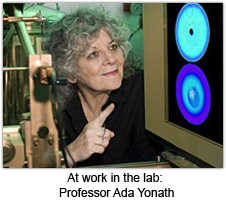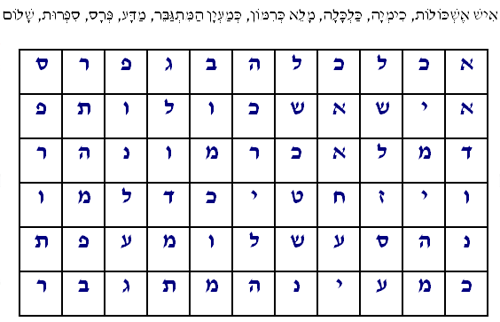 Iran’s Attack on Israel
Iran’s Attack on Israel


4 min read
Israel’s tenth Nobel laureate is a woman.
Everyone knows that Barack Obama has won the Nobel Peace prize. Also this month, Professor Ada Yonath of the Weizmann Institute in Rechovot, Israel, received a Nobel Prize in Chemistry for her pioneering work on the structure and function of the ribosome. She became the first Israeli woman to win a Nobel Prize, and the first woman in 45 years to win the Nobel Prize in Chemistry.
Yonath’s research was to determine the detailed three-dimensional structure of the ribosome (the producer of proteins in any cell), which is useful in finding ways to improve antibiotics.
 We all know that DNA carries our genetic code. However, modern biology realizes the critical role of translating the DNA into proteins. This process is not obvious and is carried out by the ribosome. Although the importance of this process was acknowledged, very few had the guts to tackle this huge challenge.
We all know that DNA carries our genetic code. However, modern biology realizes the critical role of translating the DNA into proteins. This process is not obvious and is carried out by the ribosome. Although the importance of this process was acknowledged, very few had the guts to tackle this huge challenge.
The ribosome exists only in a liquid environment of cells and it was impossible to investigate it under the known technology. Yonath first attempted to crystallize ribosomes to reveal their structure by X-rays at low temperature. After reading about the way ribosomes are rearranged on the cell membrane of hibernating polar bears, she thought, “If bears can do it, I can do it, too."
In the beginning, very few believed in her, and for many years she was considered the "crazy scientist" in her field. Well-acclaimed scientists had failed before, and she was told that her research had no chance of success. But she did not lose her faith. She faced many obstacles until she and her team, after 25 years of research, reached a series of breakthroughs that made it possible to determine the detailed three-dimensional structure of the ribosome. She used her courage, creativity and persistence to help make the world a better place.
Shai Agnon
The first Israeli to win a Nobel Prize was author Shmuel Yosef Agnon (known by the acronym, Shai Agnon), who received the 1966 Nobel Prize in Literature.
 Agnon was born in Ukraine, the son of an ordained rabbi. At age 20 he moved to Israel and adopted a secular way of life. Shortly afterwards, however, he returned to Jewish tradition and remained an observant Jew for the rest of his life. His writings deal with the conflict between traditional Jewish life and language, and the modern world. Some of his books are collections of rabbinic lore and chassidic tales; one well-known collection is Days of Awe, a treasury of traditions and commentaries on Rosh Hashana and Yom Kippur.
Agnon was born in Ukraine, the son of an ordained rabbi. At age 20 he moved to Israel and adopted a secular way of life. Shortly afterwards, however, he returned to Jewish tradition and remained an observant Jew for the rest of his life. His writings deal with the conflict between traditional Jewish life and language, and the modern world. Some of his books are collections of rabbinic lore and chassidic tales; one well-known collection is Days of Awe, a treasury of traditions and commentaries on Rosh Hashana and Yom Kippur.
In his speech at the Nobel award ceremony, Agnon introduced himself in Hebrew: "As a result of the historic catastrophe in which Titus of Rome destroyed Jerusalem and Israel was exiled from its land, I was born in one of the cities of the Exile. But always I regarded myself as one who was born in Jerusalem."
For anyone who’s been to Israel, you will recognize Agnon as the person featured on the 50-shekel bill. The design includes an excerpt from his Nobel Prize acceptance speech.
More Laureates
In a nation well-known for its longing for peace, it is not surprising to find three Nobel Peace Prize laureates: Menachem Begin (1978) who signed a peace agreement with Egypt; and Shimon Peres and Yitzhak Rabin (1994) who entered into the Oslo Accords with the Palestinians.
Two other Israelis won the Nobel Prize in Economics. Surprisingly, one of them, Daniel Kahneman is a psychologist who applied behavioral science to economics and won the prize in 2002 for his work on Prospect Theory. The other laureate, Robert Israel Aumann of Hebrew University, received the prize in 2005 for his work on conflict and cooperation through game-theory analysis.
In 2004, Avram Hershko and Aaron Ciechanover from the Technion (Israel Institute of Technology) shared the Nobel Prize in Chemistry for the discovery of ubiquitin-mediated protein degradation that plays critical role in maintaining chemical stability in human cells. This discovery has aided research of diseases such as cancer, immune and neurological diseases.
Related Vocabulary Words


Translation: prize
Transliteration: pras
Part of speech: noun, masculine

Translation: science
Transliteration: mada
Part of speech: noun, masculine

Translation: chemistry
Transliteration: chimiya
Part of speech: noun, feminine

Translation: literature
Transliteration: sifrut
Part of speech: noun, feminine

Translation: economy
Transliteration: kalkala
Part of speech: noun, feminine
Related Hebrew Names
Ada

There are two women in the Bible called Adah. One of them is the wife of Lamech, Cain's offspring (Genesis 4:19). The other one is Esau's wife.
Sagie

A modern name which means lofty, tall, immense.
Hebrew Word Search
See if you can find all the words in the puzzle below:

